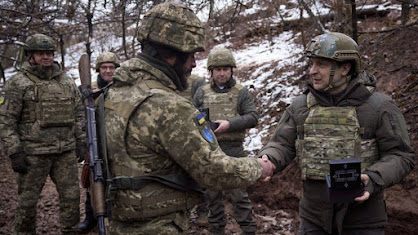What is it that Putin need and will Russia end its conflict?
At the point when Vladimir Putin broke the harmony in Europe by releasing conflict on a majority rules system of 44 million individuals, his defense was that advanced, Western-inclining Ukraine was a consistent danger and Russia couldn't feel "safe, create and exist".
Be that as it may, following quite a while of assault, a large number of passings and a departure of millions of outcasts, the inquiry remains: what is his conflict point and is there an exit plan?
Why has Putin attacked Ukraine?
The objectives he set toward the beginning of Russia's intrusion seem to have been watered down over the span of a conflict that he expected to be would be quickly won. He was unable to try and just let it out was an attack or a conflict, leaning toward the fiction of a "exceptional military activity".
In any case, what is clear is that he considers this to be a urgent crossroads in Russian history. "Russia's future and its future spot on the planet are in question," says unfamiliar insight boss Sergei Naryshkin.
The Russian chief's underlying point was to invaded Ukraine and oust its administration, finishing for good its longing to join the Western protective coalition Nato.
He told the Russian individuals his objective was to "neutralize and de-Nazify Ukraine", to safeguard individuals exposed to what he called eight years of tormenting and destruction by Ukraine's administration. "It isn't our arrangement to possess the Ukrainian region. We don't plan to force anything on anybody forcibly," he demanded.
In any case, there were no Nazis and no decimation, and Russia has forced merciless power on many towns and urban areas and joined Ukrainians contrary to its occupation.
The siege proceeds - yet most recent reports from harmony talks recommend Russia is done trying to oust the public authority and is rather focusing on an unbiased Ukraine.
Why Putin needs an unbiased Ukraine
Since Ukraine accomplished autonomy in 1991, as the Soviet Union fell, it has slowly gone toward the West - both the EU and Nato.
Russia's chief means to invert that, seeing the fall of the Soviet Union as the "breaking down of authentic Russia".
He has asserted Russians and Ukrainians are one individuals. "Ukraine never had a custom of certifiable statehood," he affirmed, denying Ukraine its set of experiences.
In 2013 he squeezed Ukraine's favorable to Russian pioneer, Viktor Yanukovych, not to sign an arrangement with the European Union, inciting fights that eventually removed the Ukrainian in February 2014.
Russia fought back in 2014 by holding onto Ukraine's southern district of Crimea and setting off a disobedience in the east, backing separatists who have battled Ukrainian powers in an eight-year war that has asserted 14,000 lives.
There was a truce, and a 2015 Minsk harmony bargain that was rarely carried out. Not long before his attack, President Putin destroyed the nonaggression treaty and perceived two Russian-upheld statelets as free from Ukraine.
As he sent in the soldiers, he blamed Nato for undermining "our notable future as a country", guaranteeing without establishment that Nato nations needed to carry battle to Crimea.
Is there an exit from this conflict?
Ukrainian official guide Mykhailo Podolyak accepts a truce could begin before long on the grounds that Russian powers are trapped in their present positions.
The two sides have spoken emphatically of progress in arrangements, and Mr Podolyak says Russia's leader has relaxed his requests.
Toward the beginning of the conflict, the Russian chief needed Ukraine to perceive Crimea as a component of Russia and to perceive the freedom of the nonconformist run east. Ukraine would need to change its constitution to promise it wouldn't join Nato and the EU.
The future status of Crimea and the Russian-upheld statelets in Luhansk and Donetsk is still a long way from being settled, however they may not be a big issue assuming the different sides consent to resolve that issue sometime in the future.
Russia seems to have acknowledged it can't dismiss Ukraine's administration and supplant it with a manikin government, as exists in Belarus. President Volodymyr Zelensky said toward the beginning of the conflict he had been cautioned "the foe has assigned me as target number one; my family is target number two".
"It seems like [Putin] should acknowledge a considerably more restricted list," says Tatiana Stanovaya, of investigation firm RPolitik and the Carnegie Moscow Center.
That is on the grounds that Russia is thinking about a "nonpartisan, neutralized" Ukraine with its own military and naval force, as per Austria or Sweden, which are both EU individuals. Austria is unbiased, however Sweden isn't. As a matter of fact it is uncommitted and partakes in Nato works out.
Not every person is persuaded Russia is haggling sincerely. France's unfamiliar pastor says Moscow ought to pronounce a truce first, since you don't hold talks "with a firearm to your head".
What are Ukraine's requests?
Ukraine's prerequisites are clear, says the official guide: a truce and the withdrawal of Russian soldiers, yet additionally legitimately restricting security ensures that would give Ukraine assurance from a gathering of unified nations that would effectively forestall assaults and "take a functioning part in favor of Ukraine in the contention".
Tying down Russian military withdrawal to pre-war positions won't just be a Ukrainian interest, it will likewise be a red line for the West, which will not acknowledge one more of Russia's "frozen clashes", says Marc Weller, teacher of worldwide regulation and previous UN intervention master.
Ukraine has likewise mellowed its position since Russia's attack, with President Zelensky saying that Ukrainians presently comprehended that Nato wouldn't concede them as a part: "It's a reality and it should be rerecognised."

No comments:
Post a Comment